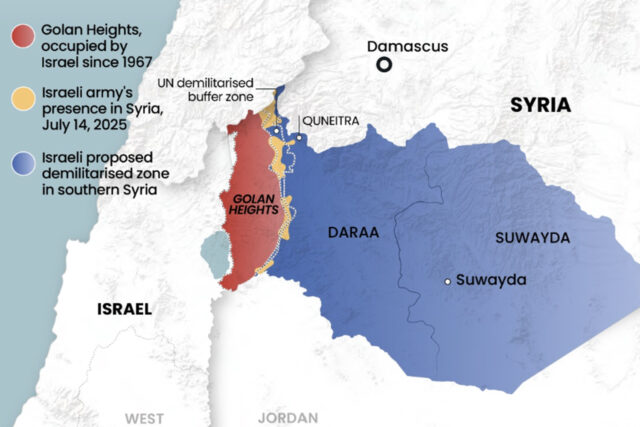It all began with a truck robbery on July 11th, when armed Bedouin tribesmen hijacked a truck belonging to a Druze merchant on the road linking Damascus with Suwayda. Retribution from the majority Druze community was swift. Clashes between Druze and Bedouins quickly escalated into open warfare. In the absence of state security forces, which had been prevented from deploying into the province by Israeli pressure, suwaydah had become a refuge for former regime criminals, drug smugglers and criminals of all persuasions.[1]
On July 13th, Bedouin fighters established unofficial checkpoints in Suwayda city’s al-Maqwas neighbourhood, capturing several members of local Druze armed groups. Armed clashes erupted in and around the area and soon spread beyond al-Maqwas to rural districts including at-Tira, al-Mazraa and as-Sawra al-Kabira. Reports confirmed the use of mortars and other heavy weapons. The Damascus–Suwayda highway was severed by armed groups, cutting off the province.

Damascus decided to intervene, misreading the positions of both the US and Israel. During recent talks in Baku mediated by Turkey and Azerbaijan, Syrian officials wrongly concluded that Israel had agreed to honour the 1974 disengagement agreement and had green lit the entry of Syrian state forces into Suwayda. President Ahmad al-Sharaa also overestimated the US commitment to Syria’s territorial integrity, particularly following statements by US envoy Thomas Barrack.[2]
On July 14th, Syrian government forces entered Suwayda, only to be ambushed by Hikmat al-Hiri’s militia. Graphic images of slain soldiers littering the road to Suwayda circulated online, alongside humiliating footage of captured troops stripped of their uniforms, paraded semi-naked—echoing the manner in which Israel treats Palestinians—and subsequently executed. Violence reached a gruesome peak when security forces and civilians were massacred inside Suwayda’s main hospital with knives, scalpels, injections and asphyxiation’[3]
As government troops pressed into central Suwayda, Israel, coordinating with Druze militias, launched airstrikes that killed dozens of soldiers and culminated in attacks on the Syrian Ministry of Defence. Several ceasefires collapsed. A US-mediated truce eventually mandated the withdrawal of Syrian forces, creating a power vacuum that al-Hiri’s militia exploited to unleash an orgy of violence and ethnic cleansing against Bedouin families—men, women and children slaughtered in the desert.
Whilst perpetrating an actual genocide in Gaza, Isreal intervenes in Syria to prevent one that is not actually happening. In fact, it intervenes on the side of those who are themselves committing the abuses
The massacre of Bedouin civilians triggered a mass mobilisation of tribal fighters from across Syria and neighbouring countries. Tens of thousands advanced on Suwayda to exact revenge. Israeli airstrikes failed to stem their advance, and Bedouin forces entered Suwayda from the west and north. Facing mounting international condemnation and fearing the annihilation of its proxies, Israel agreed to a ceasefire that permitted lightly armed Syrian government forces to return.
Government troops established a buffer zone between warring factions, facilitating the evacuation of 1,500 Bedouin civilians—mainly women and children—who had been held hostage by Druze militias. Yet Suwayda and its surroundings remain largely emptied of their Bedouin inhabitants.
Recent events show Syria remains a playground for foreign powers, its sovereignty hollowed out. Both its external relations and internal policies are dictated by outside actors, particularly the United States and Israel. Western powers have long manipulated minorities to advance their interests—from French patronage of Maronite Christians in Lebanon to the empowerment of Syria’s Alawites. Under the guise of protecting Christians, France carved Lebanon out of Greater Syria as a Christian-dominated statelet. Israel now intervenes under the pretext of protecting Druze, while pursuing its own strategic aims.
In reality, these powers care little for the minorities they claim to defend, except insofar as they serve foreign policy goals. Israel’s Jewish supremacist government, which relegated its own Druze citizens to second-class status under the 2018 Nation-State Law, is not motivated by humanitarian concern. Its interest lies in establishing a protectorate in southern Syria where expendable Druze militias absorb the human cost, while Israeli forces patrol the skies unchallenged.
At the core of the crisis lies a fundamental contradiction between US and Israeli objectives. For Israel, pre-eminence in the Middle East requires a fragmented, weakened Syria. Autonomy for the Druze would pave the way for autonomy for the Kurds and ultimately the Alawites, fragmenting the state further. The US, by contrast, seeks a stable, centralised Syria to contain sectarian divisions and prevent the rise of radical—particularly Islamist—alternatives. For Washington, there is no alternative to Ahmad al-Sharaa and his administration in the foreseeable future. US officials have openly criticised Israel’s targeting of Syrian government forces and the attack on the Defence Ministry. Several reportedly described Prime Minister Netanyahu as “reckless” and even a “madman,” warning that his actions threaten broader US objectives and de-escalation strategies.[4] Increasingly, America’s principal ally in the region is becoming a liability.
For Syria’s Sunni Muslim majority, each crisis clarifies the path forward: strength lies in numbers. The days when a Syrian national identity transcended sectarian lines are fading. A Sunni and Islamic identity is reasserting itself as the secular and nationalistic one weakens. The slaughter in Gaza, the chaos in Iraq, and the humiliation in Syria at the hands of a tiny minority reinforce the perception that the post-colonial order in the Middle East—and across the wider Islamic world—is failing.
The duplicity on which the prevailing international order is predicated is clear. Whilst perpetrating an actual genocide in Gaza, Israel intervenes in Syria to prevent one that is not actually happening. In fact, it intervenes on the side of those who are themselves committing the abuses.
[2] Syrian, Israeli officials meet in Baku: Diplomatic source in Damascus | Arab News
[3] Syrian Civilians and Soldiers’ Bodies Discovered in Sweida Hospital – World En.tempo.co
[4] Netanyahu’s Syria strikes alarm Trump team: “He’s a madman”




